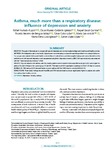Asthma, Much More Than a Respiratory Disease: Influence of Depression and Anxiety

Use este enlace para citar
http://hdl.handle.net/2183/29744
A non ser que se indique outra cousa, a licenza do ítem descríbese como Atribución-NoComercial 4.0 Internacional
Coleccións
- Investigación (FEP) [504]
Metadatos
Mostrar o rexistro completo do ítemTítulo
Asthma, Much More Than a Respiratory Disease: Influence of Depression and AnxietyAutor(es)
Data
2021-04Cita bibliográfica
Hurtado-Ruzza, Rafael et al. Asthma, much more than a respiratory disease: influence of depression and anxiety. Revista da Associação Médica Brasileira [online]. 2021, v. 67, n. 4 [Accessed 9 February 2022] , pp. 571-576. Available from: <https://doi.org/10.1590/1806-9282.20201066>. Epub 06 Sept 2021. ISSN 1806-9282. https://doi.org/10.1590/1806-9282.20201066
Resumo
[Abstract] OBJECTIVE:
The goals of this study are to compare self-reported depression and anxiety in subjects diagnosed of asthma and healthy controls.
METHODS:
We designed a case-control study. Subjects were recruited using a consecutive sampling method from a single institution. Two groups were created: Asthma and healthy controls. Data of medical history and demographic background were collected from the medical record. Self-reported depression level was assessed using Beck's depression inventory (BDI). Self-reported anxiety was measured with the “State-trait anxiety inventory” (STAI).
RESULTS:
Fifty-one subjects with asthma, and fifty healthy patients were included in this study. BDI scores (p<0.001) were higher for asthma (10.22±7.3) than in the control group (5.2±6.56). STAI state (p<0.001) was higher in asthma (42.61±11.5) than in controls (34.88±9.25). STAI trait (p<0.001) showed higher scores in asthma (43.14±10.89) than in controls (34.62±9.19).
CONCLUSIONS:
These study findings showed that BDI, and STAI trait and state scores are significantly higher in subjects who suffer from asthma than healthy controls.
METHODS:
We designed a case-control study. Subjects were recruited using a consecutive sampling method from a single institution. Two groups were created: Asthma and healthy controls. Data of medical history and demographic background were collected from the medical record. Self-reported depression level was assessed using Beck's depression inventory (BDI). Self-reported anxiety was measured with the “State-trait anxiety inventory” (STAI).
RESULTS:
Fifty-one subjects with asthma, and fifty healthy patients were included in this study. BDI scores (p<0.001) were higher for asthma (10.22±7.3) than in the control group (5.2±6.56). STAI state (p<0.001) was higher in asthma (42.61±11.5) than in controls (34.88±9.25). STAI trait (p<0.001) showed higher scores in asthma (43.14±10.89) than in controls (34.62±9.19).
CONCLUSIONS:
These study findings showed that BDI, and STAI trait and state scores are significantly higher in subjects who suffer from asthma than healthy controls.
Palabras chave
Depression
Anxiety
Asthma
Depresión
Ansiedad
Asma
Anxiety
Asthma
Depresión
Ansiedad
Asma
Versión do editor
Dereitos
Atribución-NoComercial 4.0 Internacional
ISSN
1806-9282






